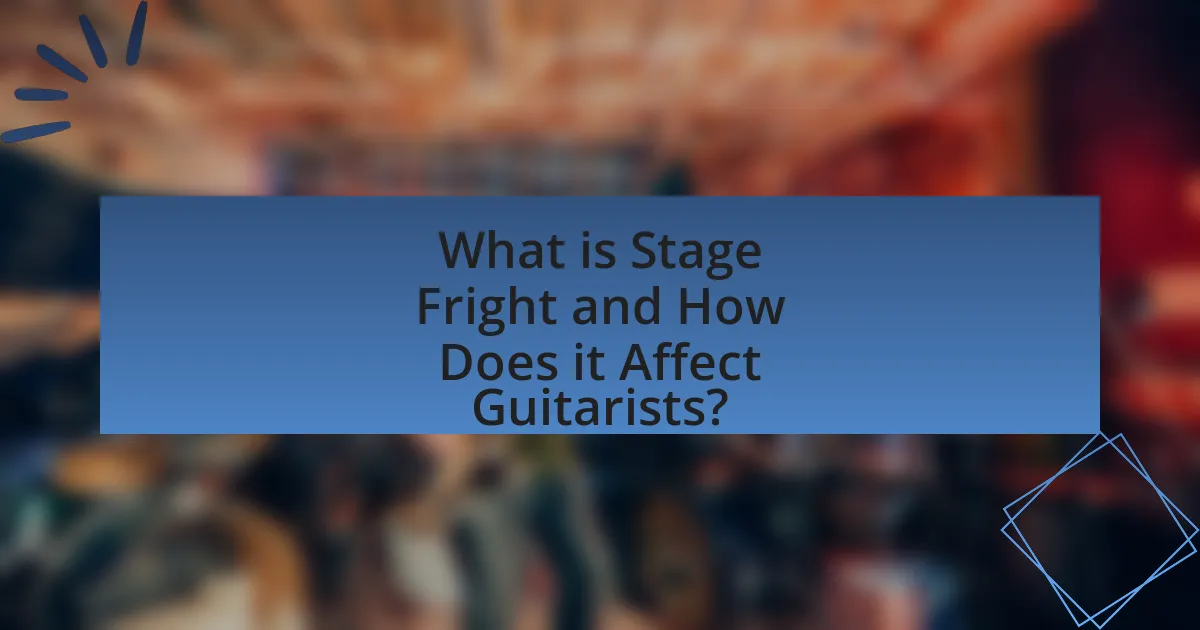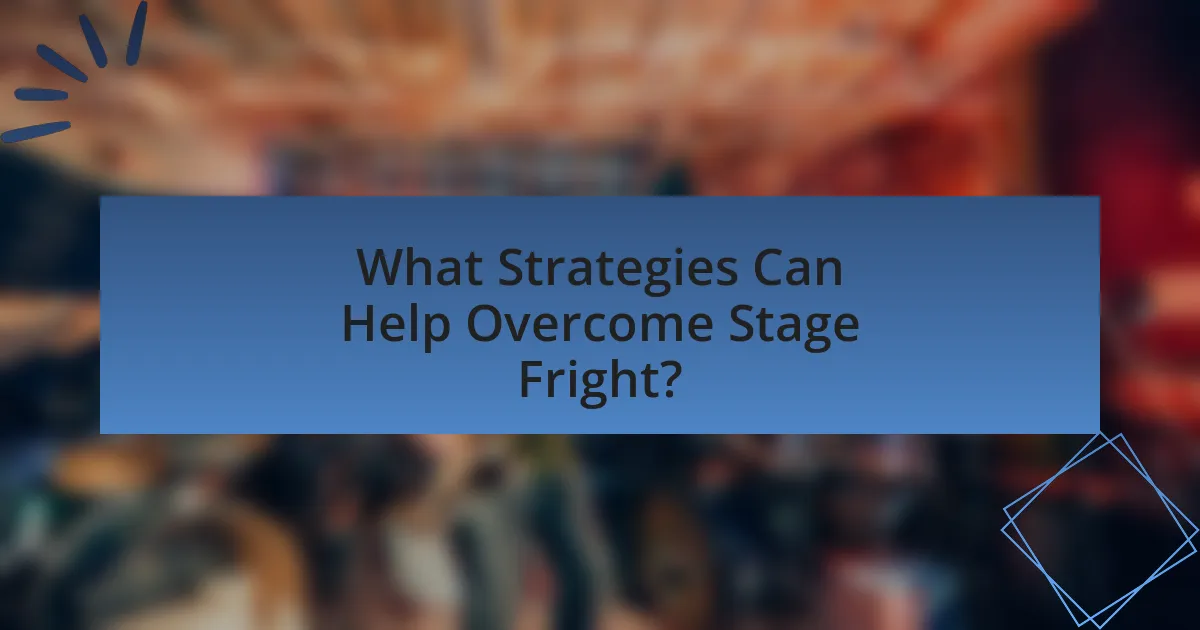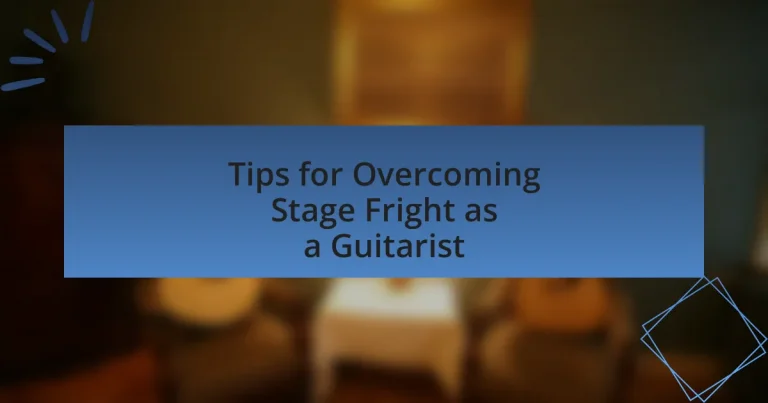Stage fright is a prevalent psychological condition affecting guitarists, characterized by intense anxiety and fear when performing in front of an audience. This article explores the symptoms of stage fright, including physical manifestations like trembling and sweating, and psychological effects such as decreased self-confidence and impaired performance. It examines the causes of performance anxiety, the consequences of not addressing stage fright, and effective strategies for overcoming it, including preparation techniques, mental exercises, and the importance of support systems. Additionally, the article highlights the role of professional help for severe cases and offers practical tips for managing anxiety during performances.

What is Stage Fright and How Does it Affect Guitarists?
Stage fright is a psychological condition characterized by intense anxiety and fear experienced by performers, including guitarists, when facing an audience. This anxiety can lead to physical symptoms such as trembling, sweating, and a racing heartbeat, which may hinder a guitarist’s ability to perform effectively. Research indicates that approximately 20% of musicians experience significant performance anxiety, impacting their confidence and overall performance quality.
What are the common symptoms of stage fright in musicians?
Common symptoms of stage fright in musicians include increased heart rate, sweating, trembling, dry mouth, and difficulty concentrating. These physiological and psychological responses can manifest as a result of anxiety before or during a performance. Research indicates that approximately 20% of musicians experience significant performance anxiety, which can lead to these symptoms impacting their ability to perform effectively.
How can physical symptoms impact a guitarist’s performance?
Physical symptoms can significantly impact a guitarist’s performance by affecting their dexterity, focus, and overall ability to play. For instance, symptoms such as trembling hands, increased heart rate, or muscle tension can hinder a guitarist’s precision and control over their instrument. Research indicates that anxiety-related physical symptoms can lead to decreased motor skills, which are crucial for executing complex guitar techniques. A study published in the Journal of Music Therapy found that musicians experiencing performance anxiety often reported physical manifestations that directly interfered with their ability to perform effectively.
What psychological effects can stage fright have on a guitarist?
Stage fright can lead to significant psychological effects on a guitarist, including anxiety, decreased self-confidence, and impaired performance. Anxiety manifests as excessive worry about performance outcomes, which can trigger physical symptoms like sweating and trembling, further exacerbating the fear. Decreased self-confidence often results from negative self-perception and fear of judgment, leading to a cycle of avoidance of performance opportunities. Impaired performance occurs when the guitarist’s focus shifts from the music to their anxiety, resulting in mistakes and a lack of connection with the audience. Research indicates that up to 40% of musicians experience performance anxiety, highlighting the prevalence and impact of stage fright in this field.
Why do guitarists experience stage fright?
Guitarists experience stage fright primarily due to performance anxiety, which is a common psychological response to the fear of negative evaluation by an audience. This anxiety can stem from concerns about making mistakes, being judged, or not meeting personal or audience expectations. Research indicates that approximately 20% of musicians report significant anxiety before performances, highlighting the prevalence of this issue among performers. Factors such as lack of experience, perfectionism, and high self-expectations further exacerbate this fear, leading to physical symptoms like increased heart rate and sweating.
What role does performance anxiety play in stage fright?
Performance anxiety significantly contributes to stage fright by inducing fear and apprehension about performing in front of an audience. This anxiety can manifest as physical symptoms such as increased heart rate, sweating, and trembling, which can hinder a guitarist’s ability to perform effectively. Research indicates that approximately 20% to 30% of musicians experience severe performance anxiety, impacting their confidence and overall performance quality. The psychological effects of this anxiety can lead to avoidance behaviors, where musicians may shy away from performance opportunities, further exacerbating their fear.
How do past experiences influence a guitarist’s fear of performing?
Past experiences significantly shape a guitarist’s fear of performing by creating associations between past performances and emotional responses. For instance, if a guitarist has previously experienced negative outcomes, such as mistakes or poor audience reactions, these memories can trigger anxiety and fear in future performances. Research indicates that performance anxiety often stems from earlier experiences, where a lack of confidence or negative feedback can lead to a heightened fear of judgment and failure. This cycle can perpetuate fear, making it increasingly difficult for the guitarist to perform confidently in front of an audience.
What are the consequences of not addressing stage fright?
Not addressing stage fright can lead to significant negative consequences, including impaired performance quality and increased anxiety levels. Musicians who do not confront their stage fright may experience decreased confidence, resulting in subpar musical execution and missed opportunities for growth. Research indicates that performance anxiety can lead to physical symptoms such as trembling, sweating, and a racing heart, which can further hinder a guitarist’s ability to focus and deliver a compelling performance. Additionally, prolonged stage fright can result in avoidance behaviors, where musicians may choose to forgo performances altogether, limiting their exposure and experience in live settings.
How can stage fright affect a guitarist’s career?
Stage fright can significantly hinder a guitarist’s career by impairing performance quality and limiting opportunities for live shows. When a guitarist experiences stage fright, it often leads to anxiety, which can result in mistakes during performances, reduced stage presence, and an inability to connect with the audience. According to a study published in the Journal of Music Therapy, approximately 20% of musicians report severe performance anxiety, which can deter them from pursuing gigs or competitions. This fear can also lead to missed opportunities for networking and exposure, ultimately stunting career growth.
What impact does stage fright have on personal enjoyment of music?
Stage fright negatively impacts personal enjoyment of music by inducing anxiety and stress during performances. This heightened state of nervousness can lead to a diminished ability to focus on the music itself, resulting in a less fulfilling experience for the performer. Research indicates that approximately 20% of musicians experience significant performance anxiety, which can detract from their overall enjoyment and connection to the music being played. Consequently, the emotional and psychological barriers created by stage fright can hinder a musician’s ability to fully engage with their art, ultimately affecting their enjoyment.

What Strategies Can Help Overcome Stage Fright?
To overcome stage fright, practicing deep breathing techniques can significantly reduce anxiety. Deep breathing helps calm the nervous system, allowing musicians to focus better on their performance. Research indicates that controlled breathing can lower heart rate and decrease feelings of panic, making it an effective strategy for managing stage fright. Additionally, visualization techniques, where performers imagine a successful performance, can enhance confidence and reduce fear. Studies show that mental rehearsal can improve actual performance outcomes, reinforcing the effectiveness of these strategies.
How can preparation reduce stage fright for guitarists?
Preparation can significantly reduce stage fright for guitarists by enhancing their confidence and familiarity with the material. When guitarists practice extensively, they become more comfortable with their songs, which minimizes anxiety about performance errors. Research indicates that thorough preparation can lead to a 20% decrease in performance anxiety, as musicians feel more in control and less vulnerable to unexpected situations. Additionally, rehearsing in front of friends or family can simulate the performance environment, further alleviating fear. This structured approach to preparation equips guitarists with the skills and mental readiness needed to perform confidently.
What specific practice techniques can build confidence?
Specific practice techniques that can build confidence include systematic desensitization, visualization, and deliberate practice. Systematic desensitization involves gradually exposing oneself to performance situations, starting with low-pressure environments and progressively increasing the challenge, which helps reduce anxiety over time. Visualization entails mentally rehearsing performances, allowing musicians to create a positive mental image of success, which has been shown to enhance performance outcomes. Deliberate practice focuses on targeted skill improvement through structured exercises, leading to mastery and increased self-efficacy. Research indicates that these techniques can significantly improve performance confidence, as evidenced by studies showing that musicians who engage in visualization and systematic desensitization report lower anxiety levels and higher confidence during performances.
How does familiarizing oneself with the performance environment help?
Familiarizing oneself with the performance environment helps reduce anxiety and enhances confidence. When a guitarist becomes accustomed to the stage layout, lighting, and acoustics, they can better anticipate challenges and focus on their performance rather than distractions. Research indicates that exposure to a performance setting can significantly lower stress levels, as familiarity breeds comfort and control. For instance, a study published in the Journal of Music Therapy found that musicians who practiced in their performance venues reported lower anxiety and improved performance quality compared to those who did not.
What mental techniques can be employed to combat stage fright?
Mental techniques to combat stage fright include visualization, deep breathing, and positive self-talk. Visualization involves imagining a successful performance, which can enhance confidence and reduce anxiety. Deep breathing helps to calm the nervous system, allowing for better focus and relaxation before and during the performance. Positive self-talk encourages a constructive mindset, replacing negative thoughts with affirmations of capability and success. Research indicates that these techniques can significantly lower anxiety levels and improve performance outcomes, as evidenced by studies in sports psychology that demonstrate their effectiveness in high-pressure situations.
How can visualization techniques assist in overcoming fear?
Visualization techniques can assist in overcoming fear by enabling individuals to mentally rehearse successful performances, thereby reducing anxiety and building confidence. When guitarists visualize themselves performing successfully on stage, they create a mental image that can help desensitize them to the fear associated with public performance. Research indicates that mental imagery can activate similar neural pathways as actual performance, leading to improved performance outcomes and reduced fear responses. A study published in the Journal of Sports Sciences by Cumming and Hall (2002) found that athletes who used visualization techniques reported lower levels of anxiety and enhanced performance, demonstrating the effectiveness of this approach in managing fear.
What role does positive self-talk play in managing anxiety?
Positive self-talk plays a crucial role in managing anxiety by fostering a supportive internal dialogue that can reduce negative thoughts and enhance self-confidence. This cognitive strategy helps individuals reframe their perceptions of anxiety-inducing situations, such as performing on stage, by replacing self-doubt with affirmations of capability and resilience. Research indicates that positive self-talk can lead to lower anxiety levels and improved performance outcomes, as demonstrated in a study published in the Journal of Sport & Exercise Psychology, which found that athletes who engaged in positive self-talk experienced reduced anxiety and enhanced focus during competitions.
How can physical techniques help alleviate stage fright?
Physical techniques can alleviate stage fright by promoting relaxation and reducing anxiety through methods such as deep breathing, progressive muscle relaxation, and visualization. Deep breathing exercises slow the heart rate and lower cortisol levels, which are linked to stress. Progressive muscle relaxation involves tensing and then relaxing different muscle groups, helping to release physical tension associated with anxiety. Visualization techniques, where performers imagine a successful performance, can enhance confidence and reduce fear. Research indicates that these methods can significantly decrease anxiety levels in performers, leading to improved performance outcomes.
What breathing exercises are effective for calming nerves?
Deep breathing exercises, such as diaphragmatic breathing and the 4-7-8 technique, are effective for calming nerves. Diaphragmatic breathing involves inhaling deeply through the nose, allowing the diaphragm to expand, and then exhaling slowly through the mouth, which activates the body’s relaxation response. The 4-7-8 technique consists of inhaling for four seconds, holding the breath for seven seconds, and exhaling for eight seconds, which has been shown to reduce anxiety and promote a sense of calm. Research indicates that controlled breathing can lower heart rate and decrease stress levels, making these exercises beneficial for musicians facing stage fright.
How can physical warm-ups prepare a guitarist for performance?
Physical warm-ups prepare a guitarist for performance by enhancing muscle flexibility, improving coordination, and increasing blood flow to the hands and fingers. These physiological benefits help reduce tension and anxiety, which are common contributors to stage fright. Research indicates that engaging in physical warm-ups can lead to improved motor skills and dexterity, allowing guitarists to execute complex techniques more effectively during a performance. Additionally, a study published in the Journal of Music Therapy found that musicians who practiced warm-up routines reported lower levels of performance anxiety, demonstrating the psychological advantages of physical preparation.

What Additional Resources and Support are Available for Guitarists?
Guitarists can access various additional resources and support to enhance their skills and manage stage fright. Online platforms like YouTube offer tutorials and performance tips, while websites such as Ultimate Guitar provide tabs and forums for community support. Additionally, local music schools and workshops often host classes focused on performance anxiety and stage presence, helping guitarists build confidence. Research indicates that participating in group lessons or support groups can significantly reduce anxiety levels, as social interaction fosters a sense of belonging and encouragement among musicians.
What role do support groups play in overcoming stage fright?
Support groups play a crucial role in overcoming stage fright by providing emotional support, shared experiences, and practical strategies for coping with anxiety. These groups create a safe environment where individuals can express their fears and receive encouragement from others who understand their struggles. Research indicates that social support can significantly reduce anxiety levels; for instance, a study published in the Journal of Anxiety Disorders found that individuals who participated in support groups reported lower levels of performance anxiety compared to those who did not. This collective experience fosters a sense of belonging and reduces feelings of isolation, which are common among those facing stage fright.
How can connecting with other musicians provide encouragement?
Connecting with other musicians provides encouragement by fostering a supportive community that shares similar experiences and challenges. This connection allows musicians to exchange advice, share personal stories of overcoming stage fright, and celebrate each other’s successes, which can significantly boost confidence. Research indicates that social support is crucial for reducing anxiety and enhancing performance, as seen in a study published in the Journal of Music Therapy, which found that musicians who engaged with peers reported lower levels of performance anxiety.
What professional help is available for severe stage fright?
Cognitive-behavioral therapy (CBT) is a professional help available for severe stage fright. CBT focuses on changing negative thought patterns and behaviors associated with anxiety, making it effective for individuals experiencing intense fear of performing. Research indicates that CBT can significantly reduce performance anxiety, with studies showing that up to 70% of participants report improvement in their symptoms after treatment. Additionally, performance coaching and exposure therapy are also utilized to help individuals gradually face their fears in a controlled environment, further supporting their ability to perform confidently.
What are some practical tips for managing stage fright during a performance?
To manage stage fright during a performance, practice deep breathing techniques to calm your nerves. Deep breathing helps reduce anxiety by increasing oxygen flow and promoting relaxation, which is essential for maintaining focus. Additionally, visualizing a successful performance can enhance confidence; studies show that mental imagery can improve actual performance outcomes. Engaging in regular practice sessions in front of friends or family can also desensitize you to the audience, making the experience feel more familiar and less intimidating. Furthermore, preparing thoroughly for your performance ensures that you feel competent and reduces fear of mistakes, as research indicates that preparation is a key factor in reducing performance anxiety.
How can setting realistic performance goals help reduce anxiety?
Setting realistic performance goals can significantly reduce anxiety by providing clear, achievable benchmarks that help musicians focus on manageable tasks rather than overwhelming expectations. When guitarists set specific, attainable goals, they can track their progress and celebrate small victories, which fosters a sense of accomplishment and boosts confidence. Research indicates that goal-setting can enhance performance and reduce anxiety by shifting focus from fear of failure to the process of improvement, as outlined in the study by Locke and Latham (2002) in the “American Psychologist.” This structured approach allows musicians to prepare effectively, leading to a more positive mindset and reduced anxiety during performances.
What strategies can be used to focus on the music rather than the audience?
To focus on the music rather than the audience, guitarists can employ strategies such as visualization, deep breathing, and practicing mindfulness. Visualization involves imagining a successful performance where the guitarist is fully immersed in the music, which can reduce anxiety and enhance concentration. Deep breathing techniques help calm the nervous system, allowing the musician to center their thoughts on the music instead of the audience’s reactions. Mindfulness practices, such as staying present in the moment and focusing on the sound of the instrument, can further divert attention from the audience, enabling a more authentic musical expression. These strategies are supported by psychological research indicating that mental imagery and relaxation techniques can significantly reduce performance anxiety and improve focus.


